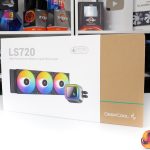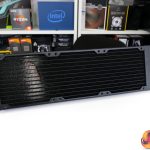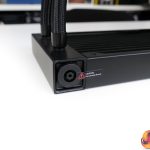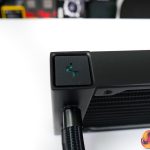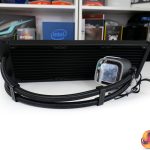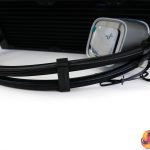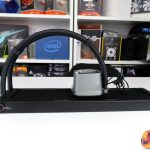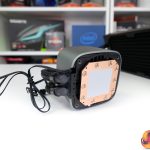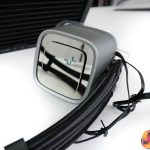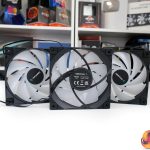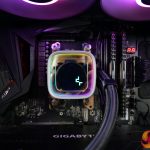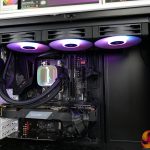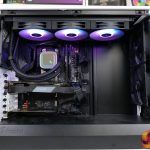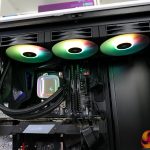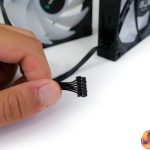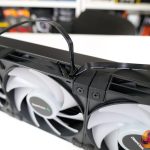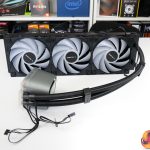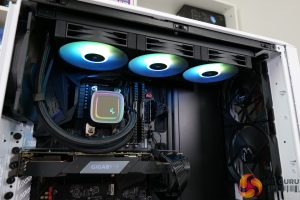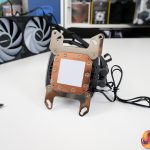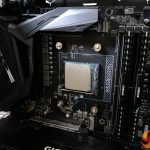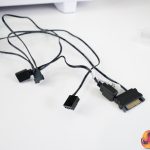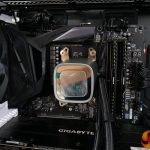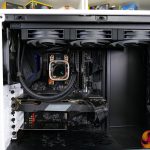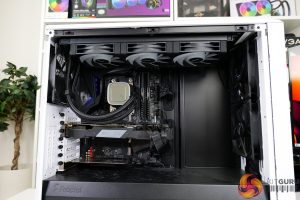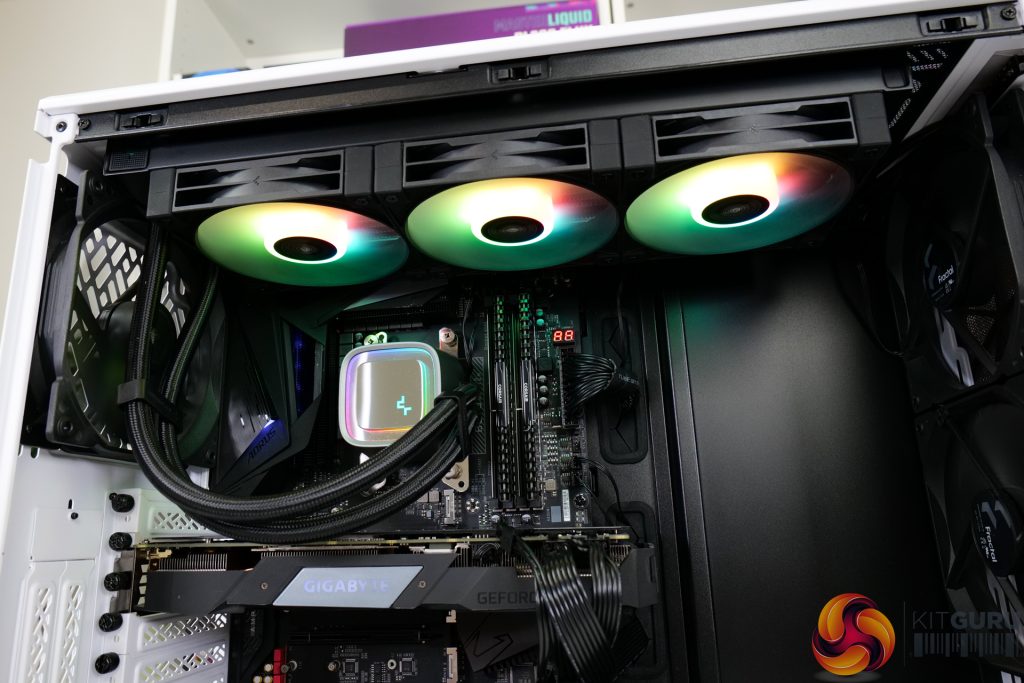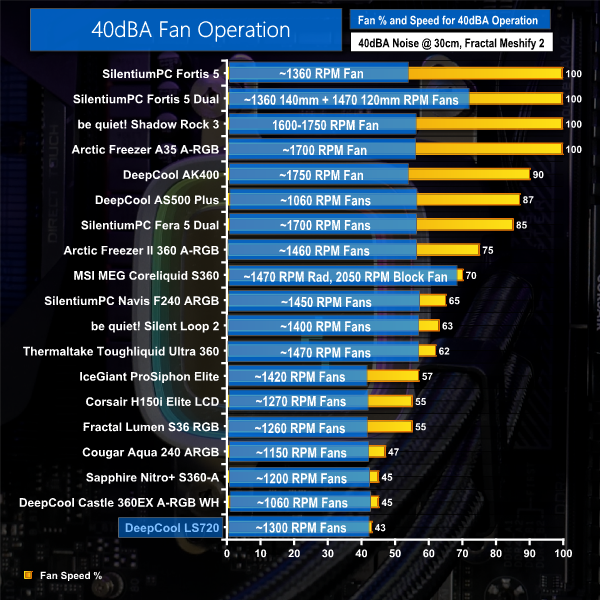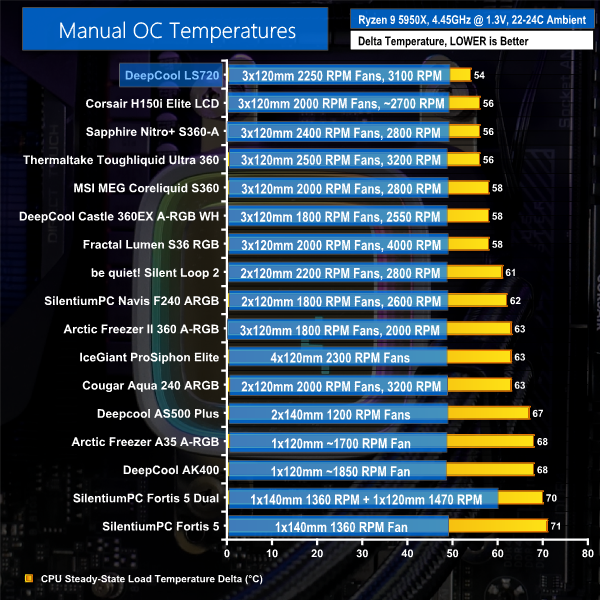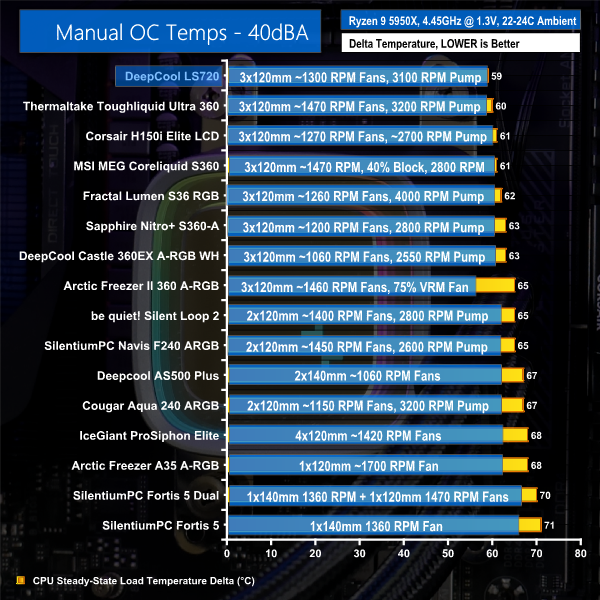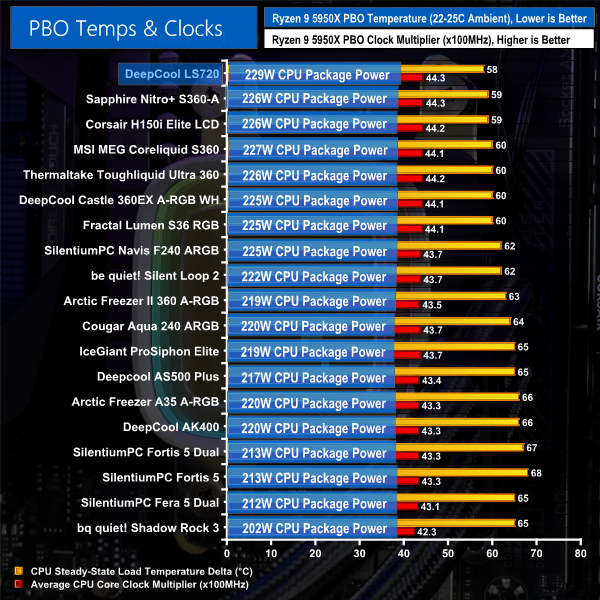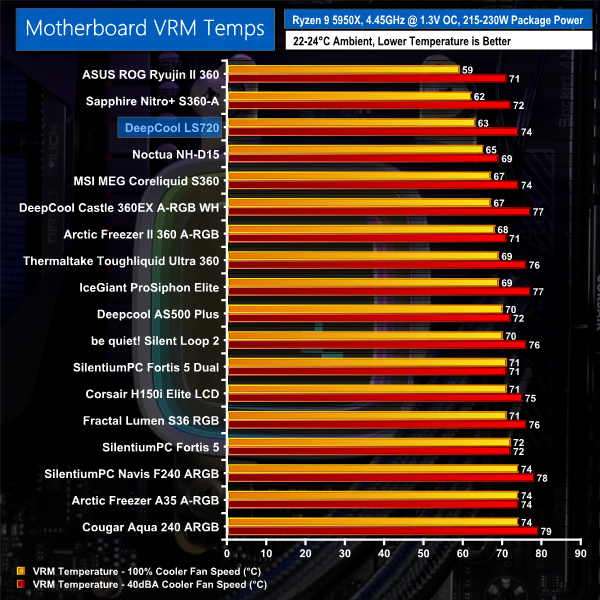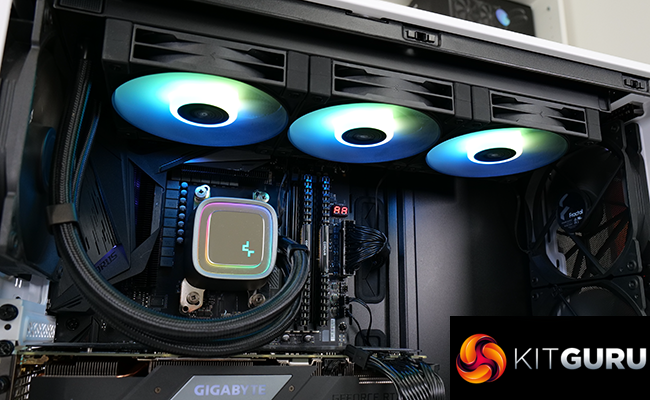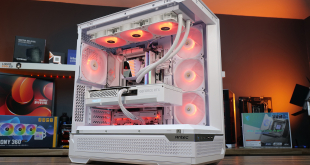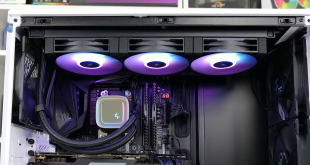
Today, DeepCool is introducing its new LS series liquid coolers. This series deploys a new 4th Gen pump design that is touted as having improved microchannels alongside its 3-phase motor. We have the 360mm LS720 in for review. This unit features a trio of 120mm RGB PWM fans together with the eye-catching Infinity Mirror cap design for the pump-block unit. Coming in at £119.99 in the UK, let’s take a closer look at the new DeepCool LS720.
Video Timestamps
00:00 Introduction
00:50 Radiator and tubing design
01:34 CPU block/coldplate
02:55 Pump and fans
04:19 Lighting and cables
05:09 Warranty info / fan lifetime
05:37 Installation process – could be better!
07:09 A note on tubing positions
07:47 Test setup
09:15 Noise levels
09:57 Thermal results
12:44 Closing thoughts
DeepCool uses a conventional 27mm-thick, 360mm-class black aluminium radiator for the LS720. It is good to see the continued inclusion of DeepCool’s Anti-Leak technology on the radiator.
This is via the EPDM pressure relief bag that contracts to create a void when pressure rises to relieve the pressure inside the radiator. In theory, this helps to reduce the risk of leakage, which is a clear positive.
The 410mm-long braided tubes have a decent degree of flexibility to them. Alongside the flexibility of the tubes, there is also a reasonable degree of adjustment at the entry points to the block.
Two plastic cable guides are pre-mounted on the reasonably thick tubing. This is a nice quality touch by DeepCool.
One of the most simplistic benefits of DeepCool’s in-house pump/coldplate design is the avoidance of patent issues with the likes of Asetek.
The cold plate is bare copper with pre-applied thermal paste. DeepCool highlights support for modern Intel and AMD platforms including HEDT, and there’s also support in place for the upcoming AMD AM5 platform, too.
In typical DeepCool fashion, the pump-block unit is physically massive – it measures in at 86x74x57 mm. We wouldn’t expect too many interference issues outside of ITX or RAM either side like on HEDT, though.
DeepCool deploys the eye-catching Infinity Mirror display that features the brand logo on a plastic face plate. This face plate can be removed and rotated in 90-degree intervals to allow for correct orientation of the logo, irrespective of one’s installation preference. There’s also an additional blank plate provided that can be installed. This is provided to allow users some degree of customisation over the visual appearance on the plastic cover.
Two light loops project an eye-catching ARGB LED glow through the Infinity Mirror display.
The 4th Gen Pump is 3-pin 12V DC-powered by a 3-phase motor. It runs at a lofty speed rating of 3100 RPM but it is disappointing to see a less controllable DC – rather than PWM – pump on a premium cooler such as this.
The trio of DeepCool’s FC120 fans feature translucent white blades that are optimised for static pressure performance. These 120mm fluid dynamic bearing fans operate at a speed range of 500-2250 RPM and are PWM controlled. The lack of a clear 0 RPM silent mode is disappointing for a premium cooler, though 500 RPM lower limit is likely fine for most usage.
What is a point of contention, though, is the proprietary connectors and cables that DeepCool chooses to use for combined fan and ARGB control. Some people are OK with proprietary, some people aren’t.
DeepCool does a very good job of implementing the daisy-chain system that carries fan speed and ARGB control with minimal cable clutter to the motherboard. And then the motherboard handles lighting control and synchronisation which means you don’t need to install additional vendor-specific software.
RGB lighting for the cooler’s fans and Infinity Mirror pump-block unit is absolutely superb. The lighting is bright, the colours are clear, and granularity is very smooth. I like the lighting on this cooler very much.
Back on the topic of cables, only a single 3-pin fan connector and a proprietary DeepCool connector emanate from the pump-block unit. This is ideal for minimising the sprawl of cables across one’s motherboard area.
Warranty is very positive for the £119.99 LS720, with DeepCool giving the unit 5 years of coverage. That’s excellent and compares nicely with the likes of Corsair and Arctic. The fans are rated at 50,000 hours MTBF, which is slim but is fine alongside a lengthy warranty.
Installation was a process that I found a little more frustrating and time consuming than it needed to be. For reference, this cooler took me about twice as long to install as a conventional Asetek competitor.
You first screw the appropriate brackets onto the bottom of the pump-block unit. But DeepCool doesn’t make is hugely clear that each bracket has a very specific position with respect to the tubing.
The default AM4 backplate is held in position with four of DeepCool’s thumbscrew stand-offs. The pump-block unit then sits on these stand-offs and is screwed into position.
Then the radiator and fans can be installed, the cables connected, and the DeepCool logo inside the infinity mirror display rotated as desired. I would recommend installing the fans on the radiator whilst it is still outside the chassis because the small proprietary cables and connectors are difficult to deal with otherwise.
The final step is to connect up the cables. DeepCool supplies break-out adapters that can be used to link SATA power, 4-pin PWM control, 3-pin ARGB, and the proprietary fans connections.
I thought the process was just a little more fiddly than the simple hand-twisted brackets used by Asetek and the conventional fan cables also used in general.
One thing I also want to note is that DeepCool does suggests there is a benefit to installing with tubes in the 6 O’clock position specifically on Intel platforms. We use an AMD platform, so 3 O’clock or 6 O’clock should be similar.
Test System:
- Processor: AMD Ryzen 9 5950X
- Overclocked Settings: 4.45GHz all-core @ 1.312V (UEFI), Medium LLC – around 1.3V delivered
- Motherboard: Gigabyte B550 Aorus Master
- Memory: 32GB (2x16GB) Corsair Vengeance LPX 3600MHz 16-18-18-36 DDR4 @ 1.35V
- Graphics Card: Gigabyte RTX 2060 Super 0dB Mode
- Chassis: Fractal Design Meshify 2
- Chassis Fans: 2x140mm 1000 RPM Fractal Front Intake, 1x140mm 1000 RPM Fractal Rear Exhaust, 1x140mm 1000 RPM be quiet! Pure Wings 2 Roof Exhaust (for air cooler testing)
- Power Supply: Seasonic Prime TX-1000
- Operating System: Windows 10 Pro 64-bit
Testing Methodology:
- For testing, we use a 30-minute looped run of Cinebench R23 and record the steady-state CPU temperature at the end of the test. This ensures that the CPU has had ample time to warm up and reach steady state under all of the coolers.
- Ambient is maintained around 22-24 degrees Celsius. Where there is variation beyond this temperature range, we add in extra repeated tests to ensure consistency.
- We also test each cooler with at least two fresh installs (typically three) to mitigate the likelihood of a dodgy mount spoiling results.
Test Results:
Acoustics
Let’s start off with noise performance at 100% fan speed. This is important for getting an indication of where our performance expectations should lie based on noise output.
Running at 51 dBA full noise output, the DeepCool LS720 is a loud CPU cooler. Even by triple-fan AIO standards, this unit it very loud. Competitors from the likes of Corsair, MSI, and Thermaltake run slightly quieter, though every bit of noise reduction is valued with DeepCool outputting at 51 dBA.
Of course, there is ample speed curve control as low as 500 RPM to reduce the fans away from their 2250 RPM top speed. Though the lack of PWM pump does limit just how much fine-tuning capacity a user has.
In order to get the unit running at 40 dBA, we had to reduce the three FC120 fans all the way down to 43% duty cycle or 1300 RPM from their 2250 RPM top speed. This is a huge reduction in operating speed and really emphasises just how aggressive DeepCool has been with its bias for thermal performance as opposed to tolerable noise output.
As a note, the pump was retained at its 3100 RPM top speed, which is realistic given the limited DC control abilities.
Thermal Performance
Super high noise output may bring acoustic irritation, but it certainly doesn’t irritate when it comes to all-out cooling performance. Put simply, the DeepCool LS720 is a liquid cooling powerhouse on our overclocked Ryzen 9 5950X test system.
Cooling the chip to a delta temperature of 54 degrees is outstanding. This beats all of the other coolers in our chart, including Asetek 7th Gen competitors with high-speed fans.
When coupled with the extremely high noise output from the LS720, it’s blatantly obvious that DeepCool is trying to brute force its way to the top of cooling charts. But that may be a tolerable solution for many users. And for those to whom it isn’t, let’s take a look at 40dBA noise-locked performance.
When locked to 40dBA noise output, DeepCool’s LS720 still manages chart-topping performance in our AMD-based test system. That’s a strong positive, particularly given how much fan speed we had to cut away to reach 40dBA. The margins are now tighter, with Thermaltake’s 360mm all-in-one being only slightly behind in performance.
Nevertheless, DeepCool’s LS720 tops this chart and still has plenty of fan speed headroom left in the tank if you really need a surge in cooling performance. That’s pretty impressive.
As always, it is critical to note that small difference in the displayed delta temperatures are not as important for our PBO testing because the clock speed and cooling power achieved are more important metrics.
With the fans back to full speed, our PBO test unsurprisingly puts the DeepCool LS720 to the top of our chart. The cooler manages a similar all-core clock speed to Sapphire’s (also very loud) Nitro+ S360-A Asetek cooler. But DeepCool’s thermal result and power managed are superior.
Just shy of 230W of AMD CPU package power handled by the DeepCool LS720 is an outstanding cooling result, even if the 100% fan speed noise output is very high.
We also see strong performance in the domain of incidental VRM cooling. Realistically, this is tied to the high-speed fans moving such volumes of air in the vicinity of our motherboard’s VRM heatsink. That results in a particularly strong 100% fan speed VRM temperature reading.
The result isn’t so positive when locked to 40dBA, as a multitude of other coolers are more competitive. Either way, though, there’s no cause for concern with VRM temperatures even with the LS720’s fan speeds constricted.
DeepCool’s new LS720 360mm AIO liquid cooler is a pretty simple product to analyse. The unit is an absolute performance powerhouse based on our AMD test system results.
DeepCool clearly achieves this superb performance by using high-speed, high-noise fans, but that’s absolutely fine for some users. And even with the fans locked to 40dBA noise output, the cooler’s performance was still incredibly strong and highly competitive.
Aesthetically, DeepCool has also nailed it, in my opinion. I think the ARGB lighting on the FC120 fans looks good and isn’t too over-the-top.
Plus, the dual RGB strips and general appearance on that Infinity Mirror display are absolutely superb. I like that DeepCool allows for a little user adjustment with the pump-block unit’s plastic cover, too. And simple control through a motherboard vendor’s ARGB software is very much preferential in my opinion.
Clearly, there are some downsides, but these are realistically minor. I found the installation process more difficult to follow and more time consuming than with Asetek competing coolers. Proprietary fan cables certainly won’t appeal to everybody when it comes to simple replacement or upgrades, but at least DeepCool does a good job with reduced cable count and effective daisy-chaining.
And the full-speed noise output really is ludicrously high. So, an effective custom cooling curve is a must. It’s just a shame that the pump isn’t PWM so doesn’t have outstanding inherent control abilities.
With that said, there are so many obvious benefits with the DeepCool LS720. Not least is that the cooler comes with a 5-year warranty, which is excellent, and the retail price in the UK of £119.99 (that’s $139.99 USD or 144.90 Euros) is outrageously low for the overall package that DeepCool offers.
Not only do I feel that the DeepCool LS720 is a clear value king when it comes to 360mm all-in-one liquid coolers, it is simultaneously one of the highest-performance units on the market in terms of sheer thermal performance based on our AMD test system. That really is an uncanny combination that should have enthusiasts running a hot AMD CPU very excited.
The LS720 is available from Amazon UK, listed at £124.99 HERE.
Discuss on our Facebook page HERE.
Pros:
- Outstanding thermal performance
- Excellent 40dBA noise-locked cooling performance
- Well-designed, eye-catching appearance with the Infinity Mirror display
- Good ARGB lighting quality
- Incidental VRM cooling numbers were strong
- Outrageously-strong value at £119.99 ($139.99 USD / 144.90 Euros)
- 5-Year warranty
Cons:
- PWM pump control would be good for noise management
- Installation was a little fiddlier than competitors
KitGuru says: The DeepCool LS720 is a performance powerhouse that looks great, is backed by a 5-Year warranty, and sells for a bargain £119.99. This really is a fantastic all-in-one liquid cooler! Highly recommended!
 KitGuru KitGuru.net – Tech News | Hardware News | Hardware Reviews | IOS | Mobile | Gaming | Graphics Cards
KitGuru KitGuru.net – Tech News | Hardware News | Hardware Reviews | IOS | Mobile | Gaming | Graphics Cards


